by Donna Peck
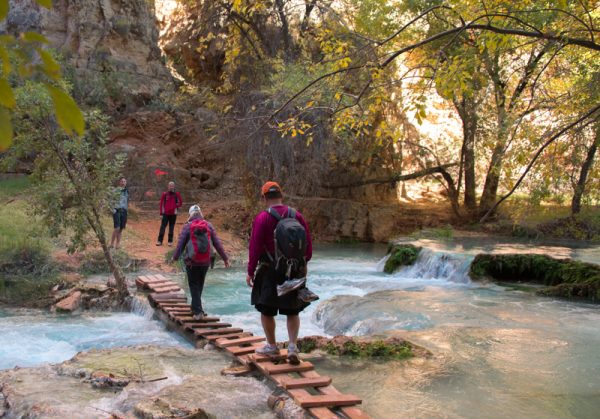 I was squished inside a van with a dozen strangers barreling toward the legendary Land of Blue-Green Water. On impulse I had signed up for a four-day trip to Havasu Canyon at the tail end of the camping season, thinking waterfalls would cure my heavy heart.
I was squished inside a van with a dozen strangers barreling toward the legendary Land of Blue-Green Water. On impulse I had signed up for a four-day trip to Havasu Canyon at the tail end of the camping season, thinking waterfalls would cure my heavy heart.
I emptied my water bottle in one gulp. Since my father passed away, I felt dried up inside. In childhood I had an easy kinship with nature. I remembered the day in the woods—how old was I? maybe six—I stood in a pool of sunlight and saw fairies. Along this empty Arizona highway, the yellow rabbitbrush and sage looked shriveled, weary, withdrawn. “Any more water in the cooler,” I called out.
On Havasupai Lands
An hour later, the van pulled into the Hualapai parking lot. I sat on a rock eating a turkey sandwich, watching Havasupai cowboys strap camping gear, coolers and mail sacks onto a half dozen mules. Dry November wind scoured the plateau with a force that could strip a dead horse to the bone. Anxiety seeped into my thoughts. My father’s death shouldn’t have been a surprise. In the past six years he had gone from the front seat of his Winnebago to a cane, a walker, a wheelchair, then a bed at Canterbury nursing home refusing to get up. He passed away alone. I promised myself on this trip I would let out my emotions. This scared me more than the freezing temperatures predicted tonight at the campground. Gary, the guide, called out above the wind, “Carry warm jackets in your day packs.”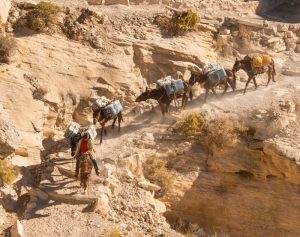
With two guides, eight campers and one backward glance, I followed the mules’ dusty cloud into the canyon below.
The Legend of the Black Bear
The switchbacks dropped us onto a broad treeless plain. I shuffled along the dry wash, my legs streaked in red clay, my eyes half-closed in the searing brightness. As we marched so did the canyon walls, toward a narrow, vertical slot. At a dark boulder, we halted to hear Josh, the guide, tell us a Havasupai legend. The rock imprisons a black bear. He threatened to seal the canyon unless the Havasupai fed him. When supplies ran out, the hungry beast thundered: Feed me your children. The villagers braced the passage with timber to keep it open, as their shaman instructed. Then they crouched in the shadows. In a rage, the bear sprang. Two warriors struck him with an enchanted club, but the blow ensnared them, too, turning all three to stone. In grief, the villagers carried away their stone warriors.
I trailed behind the others in the chilly passageway. The dank air smelled of crumbling stone. A cold shadow pricked my skin. At the funeral parlor, my father had lain in a casket as pale and placid as a frozen lake. He had a temper, and his face contorted in rage at the seven children, always underfoot. His red face terrified me: the spitting curses, the fist through the bedroom door, the leather strap, my brothers’ screams as I shook with terror outside the bathroom door beside my mother. Afterward, my father would charge out, stomp down the stairs and out the front door. My brothers limped out and we all retreated to our bedrooms, our world caving in.
Supai
An hour later, we entered Supai. Josh pointed to two stone pillars—the young men from the Black Bear legend—perched on a canyon rim. “If they topple,” he said, “the Havasupai believe their village will come to an end.” How sad, I thought. I hated my father for beating my brothers, but I also believed we would be worse off without him.
We reassembled in the dusty plaza for the final two miles.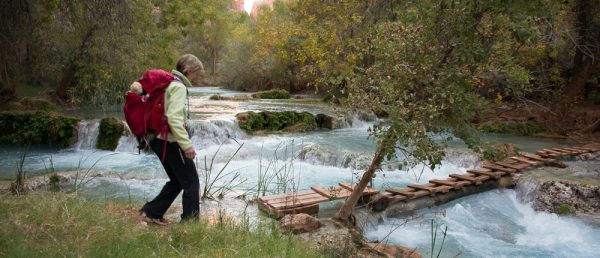
Havasu Falls Campground
Havasu Falls thundered in the darkness as I descended the stone staircase to the campground on the banks of Havasu Creek. The temperature was also plummeting.
Under the beam of high-powered flashlights, we unpacked gear and set up tents. The nylon tarp snapped and aluminum poles twanged in our hands as I struggled with my tent-mate Tanya in the raw wind. Josh and Gary set up a makeshift kitchen on a small terrace. Huddled together at a wooden table, we nibbled at the cold chicken pasta. I switched hands to keep one warm in my fleece pocket.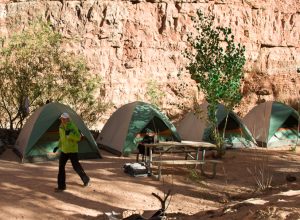
The minutes ticked by in the frosty tent. Tanya turned over in her sleeping bag. Shivering and awake, I thought of that evening my mother called with news of my father’s death.
I had been on my way to an art opening. The news at first didn’t sink in. At the gallery, I wandered into the “Cutting Away” exhibit and stood a long time before a tall white oak. The hollow trunk, held up by steel brackets, its bark stripped, its sides cut into spirals, missed its life force. Tears exploded. I escaped to the sidewalk and the loss of my father overtook me. In the tent, tears burned my cheeks. I huddled into the sound of the waterfall and let it drag me under.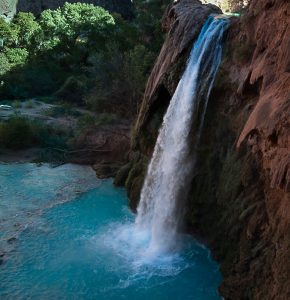
Havasu Falls, Rock Falls
After breakfast our guides hurried us in the short-lived sunlight to Rock Falls, only thirty-five-feet high and perfect for diving. Gary scrambled up the backside and inched along the edge. You go, Gary. He steadied himself then took off, arms outstretched. I held my breath. His airborne body filled me with envy. Why didn’t I have the nerve to jump off a waterfall? Gary arched into the dive and hit the pool dead center. How cool! Seconds later his face broke the surface with a huge grin that hit home the thrill I had just missed. 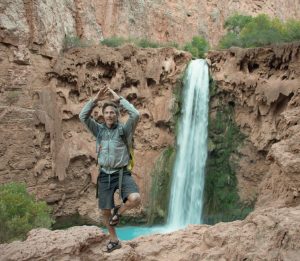
Mooney Falls
The next day I emerged from a tunnel onto a narrow ledge cut into the cliff beside Mooney Falls, the highest in Havasu Canyon at nearly two hundred feet. Mist pricked my face and legs. The trail continued down a ladder, which dripped with red clay. I grabbed hold of the chain bolted into the limestone and heaved my body onto the first rung.
I hung on a slippery chain and inched my way down. If I lost my footing, my body would swing out in mid-air, eighty feet above a foaming pit of blue-green water.
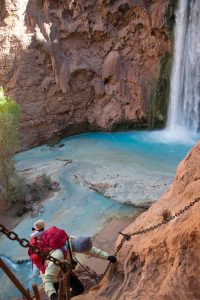
The crashing water pounded in my head like a jackhammer. The chain, as if covered in Vaseline, slipped in my fingers. My hands slipped another inch. A memory took over my body. I had flown from California to New Jersey to help out at home after my father had a stroke. One morning, I opened the car door to help my father into his wheel chair for his physical therapy session. He refused to get out. “Come on, Dad; you’ll feel better after your therapy.” His face contorted and he roared at me. I started shaking. I had forgotten about that temper tantrum. I tightened my grip on the chain and lowered myself, still shaking, onto the muddy shores of Mooney Falls.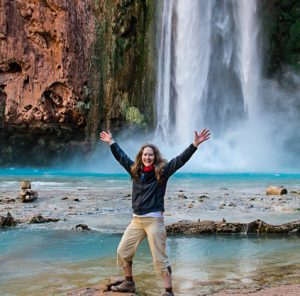
Loren
I spent the next afternoon on my knees sifting dirt for small stones and putting them in plastic bottles to make rattles.
“Let’s see how you are doing,” Loren said, picking up one of the plastic bottles and shaking it. He grimaced. His black hair stuck out at odd angles beneath a tan fishing cap. He had small dark eyes and a broad face of smooth coppery skin but his hands looked as eroded as sandstone. For centuries the people of the blue-green water have lived in the canyon, tending crops of corn, beans and squash. In winter, they hunted their vast lands on the upper plateaus. In 1882, the U.S. Government confined them to a 518-acre reservation in the canyon but in 1975, Congress restored 180,000 acres of their original upland hunting grounds. The previous evening the Havasupai elder had visited our camp, which is under permit from the tribe, and invited us to a bonfire. He would teach us the round dance but needed a volunteer to make rattles.
“Well, that’s not right at all,” he said, speaking through gaps in his missing teeth.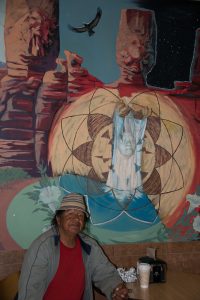
“What do you mean,” I shot back. “I’ve been scrambling in the dirt all afternoon. Do you know how hard it is to find small, round pebbles?”
Well, the sound’s not right,” he said. “Listen,” he shook the plastic bottle, keeping his face neutral.
“I have no idea what you’re talking about.”
“Small, round pebbles, no rough edges makes a sound that you can listen to all night.” Loren got down on his hands and knees and felt around in the dirt. “Here’s one; find fifty more.”
I hated the dirt, hated having to wear this dirt because there were no hot showers. Every time I signed up for a trip, there was always some hitch. I emptied the bottle and shifted the dirt, chanting to myself, “small round pebbles, no sharp edges.” I shook the second bottle and this time it sounded hypnotic, like a shaman’s tool, like rustling autumn leaves.
The Bonfire
At the bonfire, Loren picked up a branch from the wood pile and began beating a plastic water drum, chanting in the Havasupai dialect. I got up and passed out the rattles. Shaking the bottles, we circled the fire, stepping left, falling into rhythm.
The sparks shot higher and lit our faces. Dancing and striking the plastic bottle against my palm, I dropped into my sadness. I saw in the flames my conflicted relationship with my father. The frightening monster who might gobble me up and the smiling parent whose attention made me feel loved. The fire light grew dim. Loren silenced his drum and our bodies halted. Three hours had passed.
The Cottonwood
We packed up the next day for the ten-mile return hike. At Black Bear Rock, a cottonwood tree had transformed into foliage so brilliant it painted the air yellow. It was a roadside shrine thriving from a hidden source of water.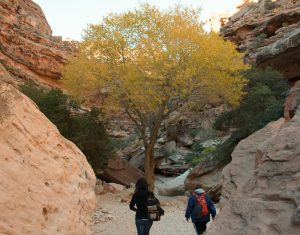 I thought of my father but this time I saw his face light up as I stepped through the door on my many visits home. After his stroke he could no longer get up to greet me, but his face still lit up, saying “Donna Ann,” in the special way he said my name.
I thought of my father but this time I saw his face light up as I stepped through the door on my many visits home. After his stroke he could no longer get up to greet me, but his face still lit up, saying “Donna Ann,” in the special way he said my name.
When he was himself, I forgot his rages and loved him. I would like to remember my dad as the cottonwood tree rather than the Black Bear. But he was both. Fear, guilt, anger, were forever entangled in my love for my father. A soft breeze settled on my shoulders. I sighed and turned to catch up with the others.—text and photography by Donna Peck
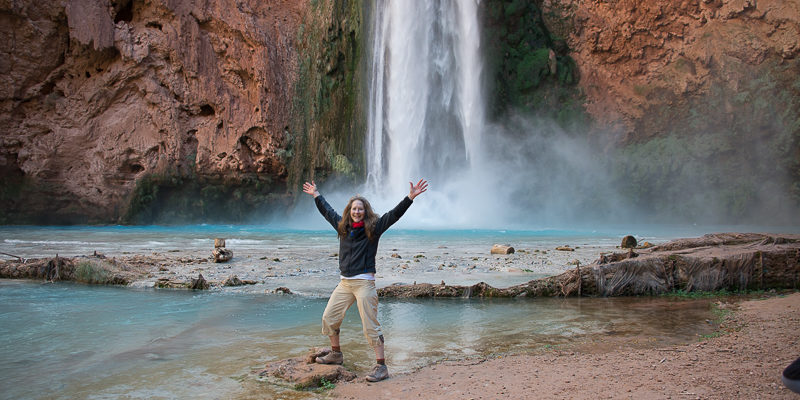
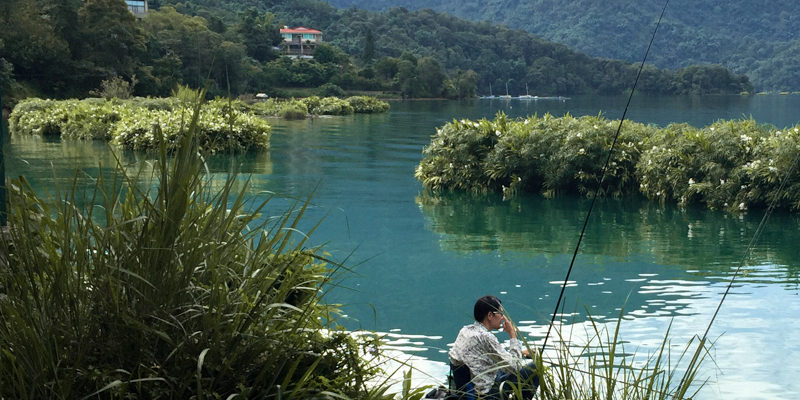
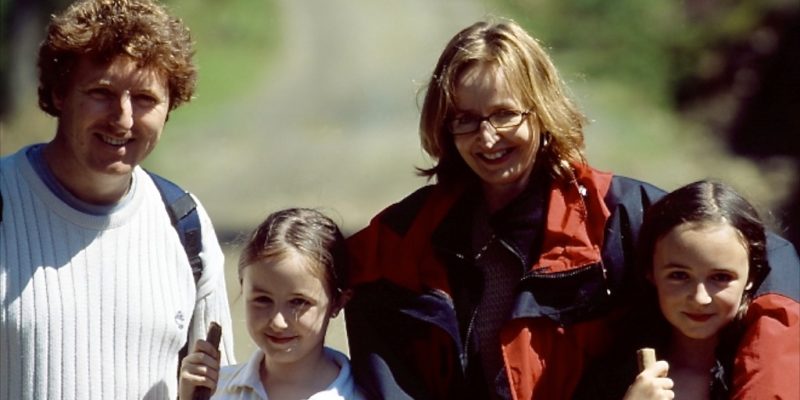
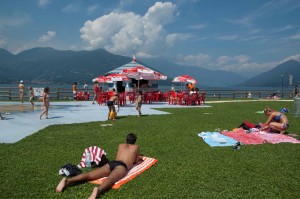
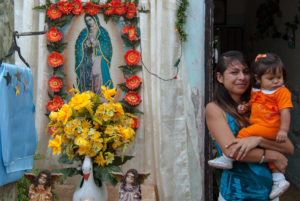
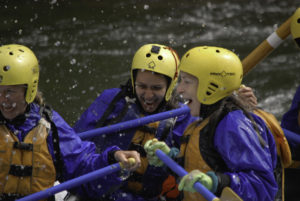
Leave a Reply